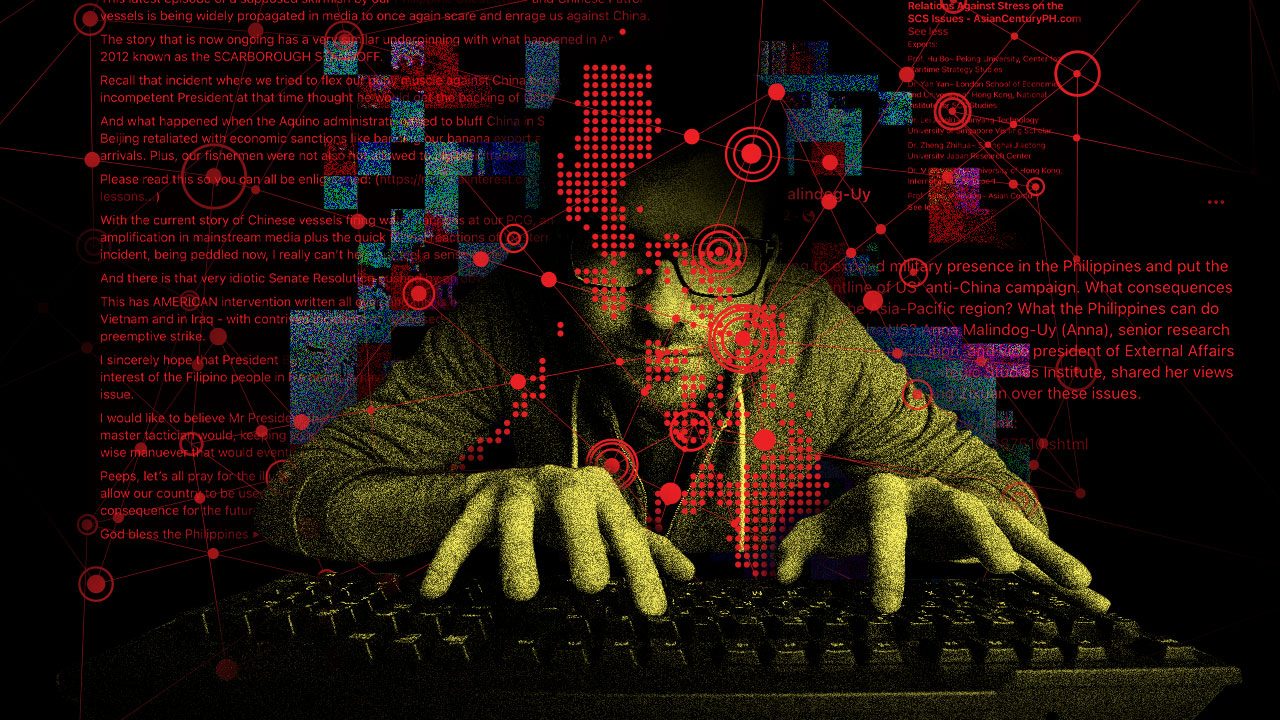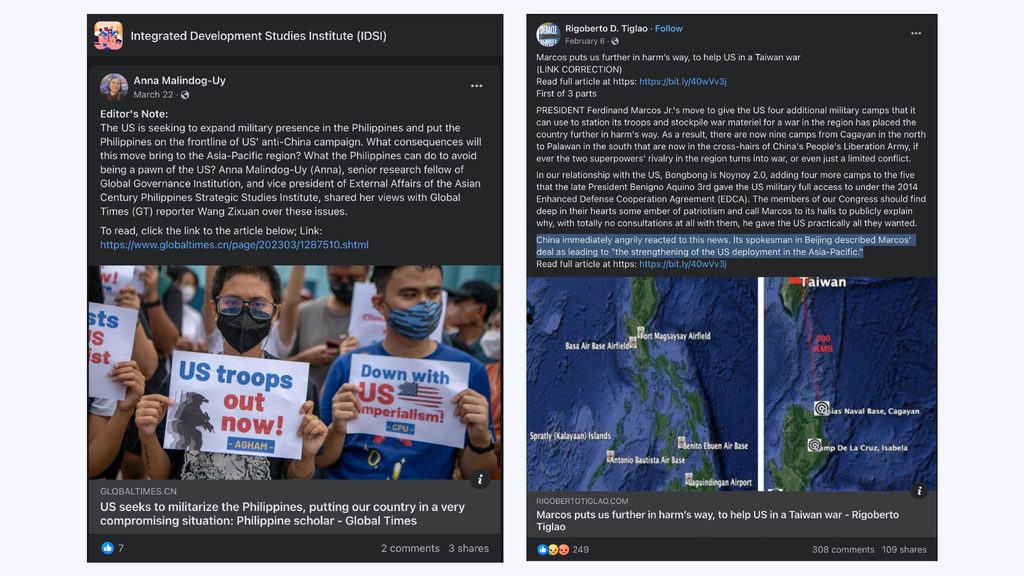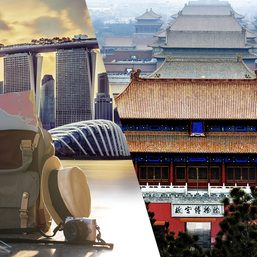SUMMARY
This is AI generated summarization, which may have errors. For context, always refer to the full article.

This story used findings from a study conducted by TheNerve for Internews.
MANILA, Philippines – On August 5, the Chinese Coast Guard (CCG) attacked and aimed water cannons at two Philippine ships on their way to bring fresh supplies to the BRP Sierra Madre stationed at the Ayungin Shoal.
Both the Armed Forces of the Philippines (AFP) and the Philippine Coast Guard (PCG) condemned the CCG’s harassment the next day. The two ships were on a routine troop rotation and resupply mission to bring food, water, fuel, and other supplies to Philippine military troops assigned to the BRP Sierra Madre, a World War II-era ship that was intentionally grounded on Ayungin back in the ’90s. The mission was not completed because of the incident.
“The PCG calls on the China Coast Guard to restrain its forces, respect the sovereign rights of the Philippines in its exclusive economic zone and continental shelf, refrain from hampering freedom of navigation, and take appropriate actions against the individuals involved in this unlawful incident,” the PCG said in a statement.
On social media, however, a different sentiment was brewing. Instead of condemning the attacks, there were posts that criticized the way the PCG reacted to the situation – with some even lambasting coast guard officials and questioning their authority.

There were also posts that downplayed China’s actions, implying that the government’s reaction could be a form of “mind conditioning” against China.
These attempts to dismiss harassment by China at Ayungin is just one example of how pro-China sentiment is being seeded online. An investigation by Rappler found that there is a pro-China community on Facebook that for years has been spreading propaganda and disinformation to support China – formed during former president Rodrigo Duterte’s administration.
The top actors in this community are getting away by claiming supposed academic expertise to gain legitimacy.
‘Malign information operations’
The National Security Council (NSC) is currently monitoring online actors pushing pro-China narratives, following China’s water cannon bombing in August. NSC Assistant Director General Jonathan Malaya said they noticed how online posts echoed China’s claims that their use of water cannons against Philippine ships was benign.
“That’s what alarmed us already and that opened our minds to the reality of what is called malign information operations. Nandito pala talaga sila (They really are here),” Malaya said in an interview with Rappler.
Chinese influence in the Philippine online space is not new. In 2020, Facebook took down an “inauthentic network” attributed to Chinese individuals. This network included participants who shared content endorsing Duterte, supported China’s maritime claims in the South China Sea, and advocated for increased Chinese influence in the region.
A year before this, Facebook took down another inauthentic network composed of actors run by “individuals associated with the Chinese government” in 2019.
But even after the takedowns, several pro-China voices remained online in the Philippines.
Duterte started pivoting the Philippines’ foreign policy toward China in the first year of his presidency – a move that involved severing ties with previous Western allies. Duterte openly expressed his distrust of the US throughout his term, and often referred to China as a “friend.”
This move fueled pro-China posts online. An analysis of public posts containing pro-China keywords from 2016 showed that these posts were being seeded within hyperpartisan communities, led by vitriolic pro-Duterte bloggers who were legitimized by the Duterte administration.
An initial spike in pro-China posts on Facebook came around the second quarter of 2018 when China installed missiles on artificial islands in the South China Sea region. These online posts downplayed China’s actions.

These narratives are rooted in the arguments that downplayed the Philippines’ victory in the Hague, where the former Aquino administration brought the country’s case to the arbitral tribunal against China over the West Philippine Sea in 2016.
They justified and promoted China’s offers for joint exploration in the areas covered by the Philippines’ exclusive economic zone, despite the country already winning the arbitral ruling.
For Malaya, these narratives are dangerous. “We need these resources for the benefit of the country, our fishermen, our blue economy – which we hope will bring us economic development. So this is not just about territorial integrity or sovereignty. This is also about food security,” he said.
But when is the line drawn between a mere expression of opinion and harmful propaganda?
“If you write something on your Facebook post, or you make a public statement, or you write up a column, that doesn’t mean you’re pro-China. You’re just expressing your freedom of speech. But we got alarmed when we saw that they’re organized. They’re following the script coming from China,” Malaya said.
The issue of the Enhanced Defense Cooperation Agreement (EDCA) bases also became a hot topic for pro-China actors online. Pro-China posts again spiked in the first half of 2023, after the Marcos administration announced in February that it would give the US access to more military bases. The posts harped on the country’s dependence on Washington and the dangers this poses.

The pro-China posts echoed the claims of Chinese state media that the additional military bases for EDCA make the Philippines a “pawn” in the impending US-China war over Taiwan – a claim that has been repeatedly denied by the Philippine government.
“If the Philippines’ and the US’ interests intersect, that doesn’t mean that we are a pawn. It just means that the Philippines is pursuing its own national interest, and the US is also pursuing its own national interest. And there will be times that those interests will diverge,” Malaya said.
Despite these posts not gaining high interactions on social media, Malaya said there is a need to sound the alarm.
“We should care because you know how powerful fake news can be. It’s critical that we, as a nation, are together in this because it is an external security threat. When you have an external security threat, that’s when you have to have what is known as social-cultural cohesiveness,” he said.
Malaya added that public support is important since the Philippines is a democratic country. “We need strong public support for us to be able to push and continue to assert our rights in the West Philippine Sea.”
‘Experts’ and ‘think tanks’ as prominent pro-China voices
Rappler’s investigation found that these pro-China posts and commentaries often came from bloggers and websites that use technical language and flaunt their supposed academic credentials to appear credible.
A prominent actor pushing pro-China narratives is Integrated Development Studies Institute (IDSI), a group that presents itself as a think tank. Despite claiming to be a think tank, it had no original published study on its website, which is no longer available as of October 30. Yet it regularly posts pro-authoritarian, anti-liberal content that is skewed favorably toward China on its Facebook page created on April 6, 2018.

IDSI frequently attacked independent media organizations critical of the Duterte government and members of the political opposition. Rappler had flagged its Facebook page for posting disinformation on at least two separate occasions in the past.
A quick search on the SEC online database pulled up zero results for a company under the name “Integrated Development Studies Institute” or “IDSI Center.” A check with the DTI business registration online database also yielded nothing.
IDSI was often given a platform by Manila Times and SMNI, two media organizations with histories of fueling disinformation and attacking critics of the Duterte government, through interviews and opinion columns.

Among IDSI’s supposed “thinkers,” or their equivalent of thought leaders, is Sass Sasot, a prominent pro-Duterte blogger who has also been flagged for spreading disinformation several times.
In an email to Rappler, IDSI responded on November 11 saying that they feel that the allegations are inaccurate. “We are concerned that emotions being raised may lead to military conflict, or irreparable harm to neighborly relations and development for decades or more,” IDSI said.
“Our materials, though some may call ‘controversial,’ are meant to balance a particular narrative or issue, by bringing up alternative points and analysis, all verifiable. They may sometimes sound like pro-China, or pro-Vietnam, or pro-India, or [pro-]Singapore, or pro-US, or other countries depending on the aspect or issue being discussed.”
IDSI said that they post analyses that are based on information that is publicly available and verifiable. “Everybody is ‘foreign-influenced.’ We should point out that countries and organizations that progress are the ones that adopt innovations from everybody. Our civilizations have progressed from learning from Greece, Rome, Europe, America, India, Arabia, China.”
Rappler’s investigation found that IDSI and Sasot’s pro-China posts were then funneled into hyperpartisan Facebook groups. Rappler found two prominent hyperpartisan groups where pro-China posts abound: a Facebook group managed by IDSI’s Facebook page using the same name, and Philippines-China Friendship Club (PCFC).
These actors, however, often claim that they are only promoting strong relations with China because the Philippines would benefit from it.
“Yes, there is a dispute between the Philippines and China, which our political leaders have shown the ability to manage peacefully over the years, not without occasional incidents, as is true even with allies. But there are also many positive areas in PH-CH relations that should also be recognized, just like with our relations with other countries,” IDSI said, acknowledging the recent tensions between China and the Philippines.
“IDSI’s central advocacy is how to improve life for Filipinos: How can the Philippines position to get more jobs and investments, improve the life of the average Filipino, given the world financial situations, disruptive technologies developing, groupings taking shape economically, politically, in product categories?” IDSI said in the email response.
But for Malaya, this doesn’t apply when actors echo Chinese statements that have a clear intent to mislead the public. Without naming names, he said that “they are, at the very least, propagandists or willing proxies of China in their malign information operations.”
Dwindling influence on social media
Rappler tracked the evolution of the communities participating in the discourse about China since 2016 using a community clustering algorithm. The algorithm connected Facebook pages, accounts, and groups that have shared the same sources.
The network maps below show the evolution of the communities per year. Each node represents a Facebook entity (page, group, or account), and how they are linked together when they have shared content from similar sources. The colors represent the communities, which are formed when entities have a high affinity to each other.
Even though there were already pro-China posts as early as 2016, it was only in 2018 when a distinct pro-China network was formed around Duterte bloggers who were promoting his pro-China stance in a coordinated manner. Before this, top sources of pro-China propaganda were dubious websites.
However, by 2023, the pro-China community had become isolated from other Facebook communities participating in conversations on China, indicating that they now have a smaller reach.
This cluster, which was previously composed of pro-Duterte and pro-Marcos networks, also no longer included communities that support President Ferdinand Marcos Jr. – reflecting his decision to rekindle ties with the US.
The Marcos government’s active decision to release photos and videos about incidents in the disputed waters contributed to the dwindling reach of pro-China narratives online, Malaya said, adding that the Duterte government’s policy before was to not share with the public the skirmishes for operational security.
“The decision to embed media in Coast Guard vessels was a big decision,” Malaya said. “At the end of the day, we thought it would be better for the national interest to allow the public to see what’s happening.”
From online to on-ground activities
Today, Sasot and IDSI remain among the pro-China network’s top sources of information online. New sources have emerged, too, including Anna Malindog-Uy (moderator of Facebook group PCFC) and another organization called Asian Century Philippines Strategic Studies Institute (ACPSSI) through its Facebook page Asian Century PH.
ACPSSI also describes itself as a think tank but similar to IDSI, it has no research studies on its website and has published position papers only. It often features Malindog-Uy, who serves as its director and vice president for external affairs. The page was created on June 25, 2022.
Rappler reached out for comment to Malindog-Uy through her website and LinkedIn profile on October 30 and 31, respectively. We have not received a response as of publication, but will update this story once she responds.
As the pro-China networks online appear to be dwindling, it seems like the actors are starting to shift their resources to more on-ground activities, such as press conferences.

ON-GROUND EVENTS. Screenshots of posts about China-related events hosted by Asian Century PH. Rappler screenshots
IDSI and its thinkers have been tapped as resource persons in several events and various news reports on geopolitical issues. These events were usually organized by ACPSSI and Global Talk News Radio, with radio show host Herman Tiu Laurel often joining the panels. They have invited Chinese academics to their events, which Malaya said, was what prompted them to look into these activities.
“They have become apologists. Expressing your opinion and promoting RP-China understanding is different from becoming an apologist,” Malaya said.
With the Philippines’ ongoing disputes with China, these activities should trigger alarm bells – especially since previous Rappler investigations have shown that the Philippines is vulnerable to foreign influence operations.
“We are a democracy and we respect the rights of individuals to freely express their positions on matters of national concern. However, once they utilize these fora for the purposes of disinformation, misinformation, utilizing the Chinese narrative, the ones coming from Beijing, then it becomes a threat. And that is exactly what is happening now,” Malaya said. – with reports from Gemma Bagayaua-Mendoza and Gaby Baizas/Rappler.com
This study was made in collaboration with TheNerve, a Manila-based consultancy that specializes in analyzing data to bring forth powerful insights and narratives. Believing that data can deliver real-world impact, the company enables its partners across a wide range of industries to cut through the clutter and extract value and meaning from various datasets. The insights guide partners’ business decisions and help them engage with their communities better. Composed of a team of data scientists, business strategists, award-winning storytellers, and designers, the company is on a mission to transform data science into data relevance.
2 comments
How does this make you feel?




![[DECODED] The Philippines and Brazil have a lot in common. Online toxicity is one.](https://www.rappler.com/tachyon/2024/07/misogyny-tech-carousel-revised-decoded-july-2024.jpg?resize=257%2C257&crop_strategy=attention)














I’m looking for China’s Roberto Tiglao. I will find it amusing to read his columns.
Thanks to Rappler and TheNerve for this initiative. Without information on the actions of the pro-China propagandists, it is difficult to track and contain them. The recent conflict between the Marcos and Duterte Political Dynasties has been shown in the separation of their respective Disinformation Machineries. Again, thanks to both Rappler and TheNerve – be careful and vigilant as always.